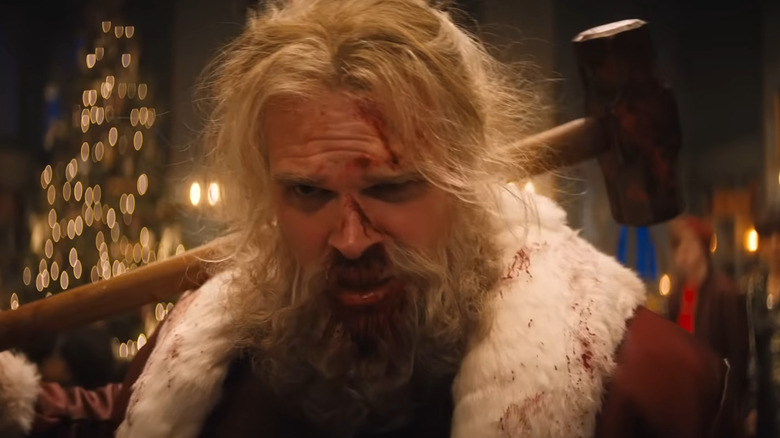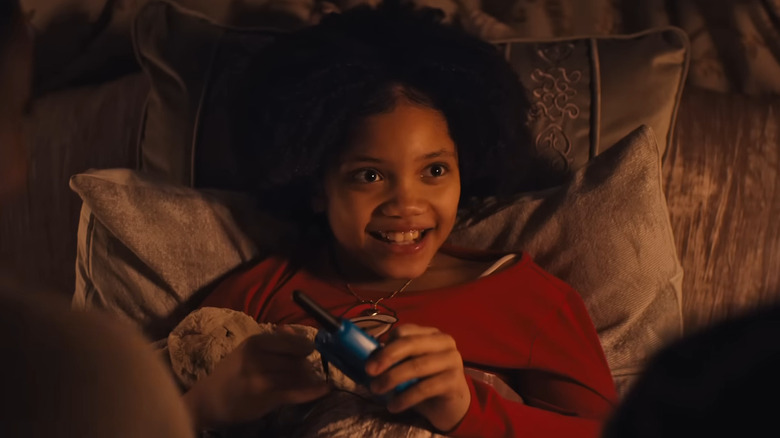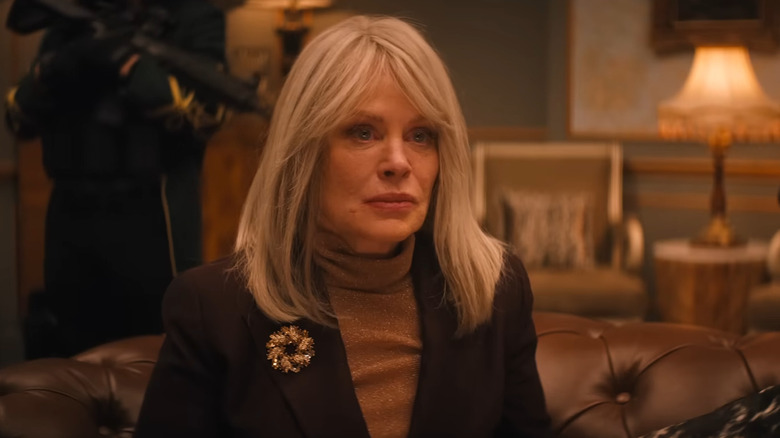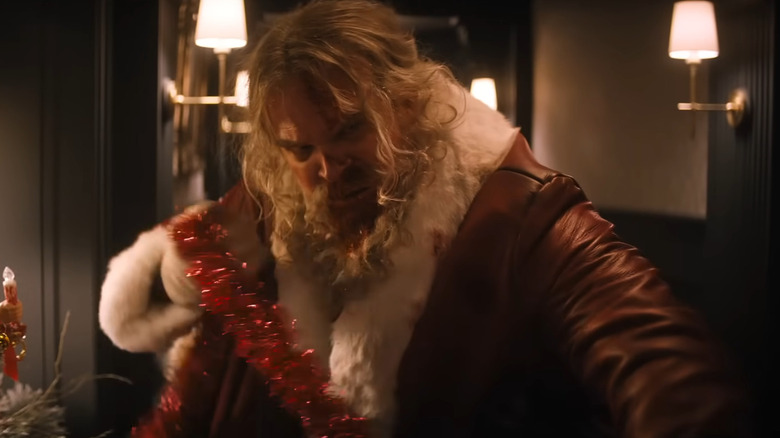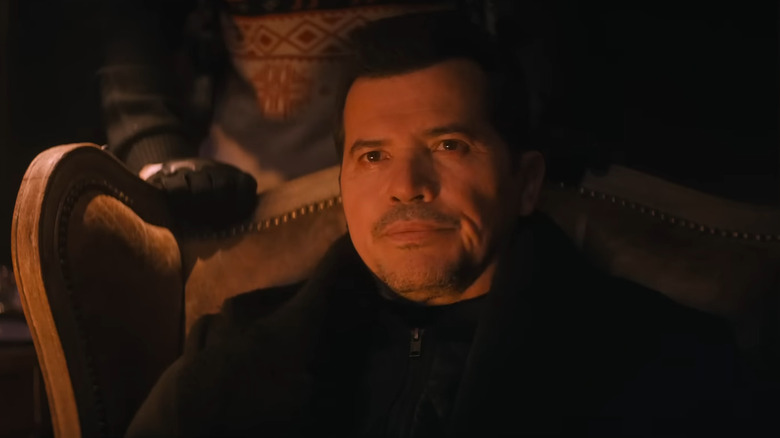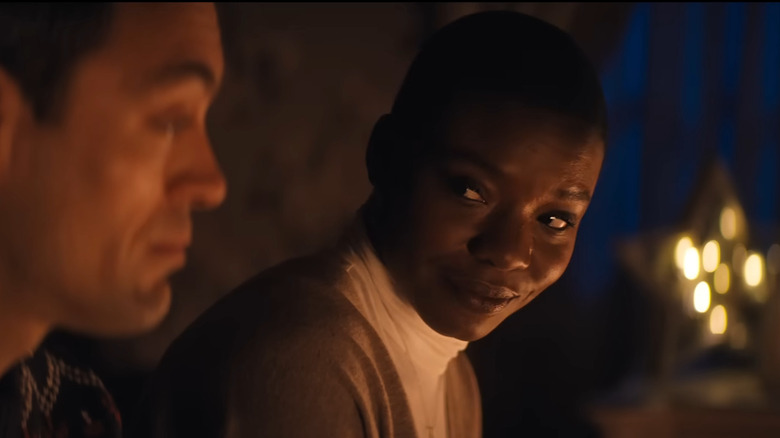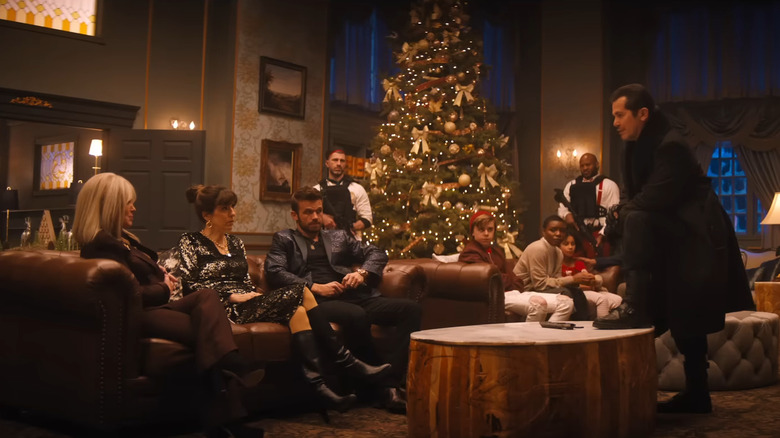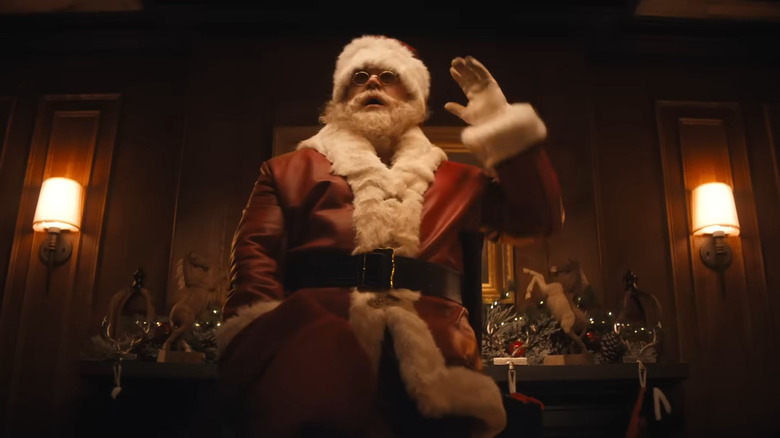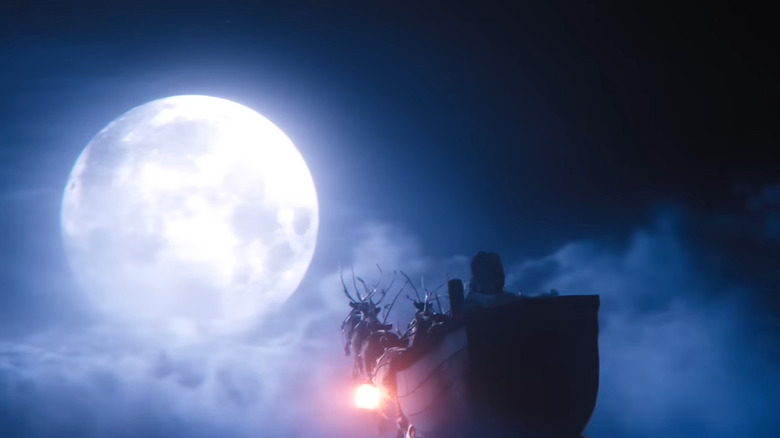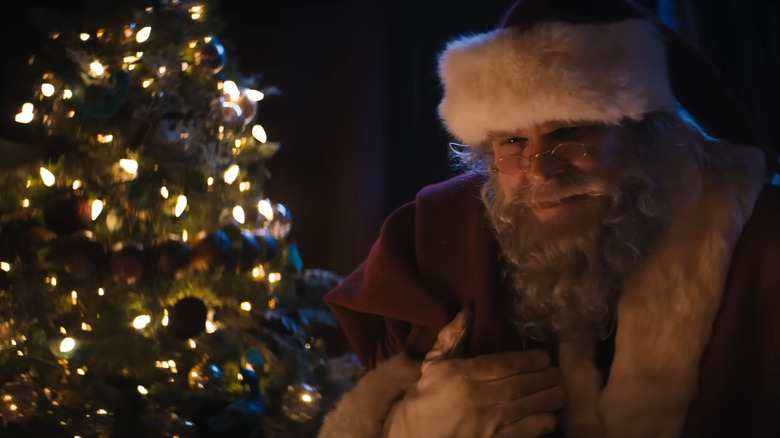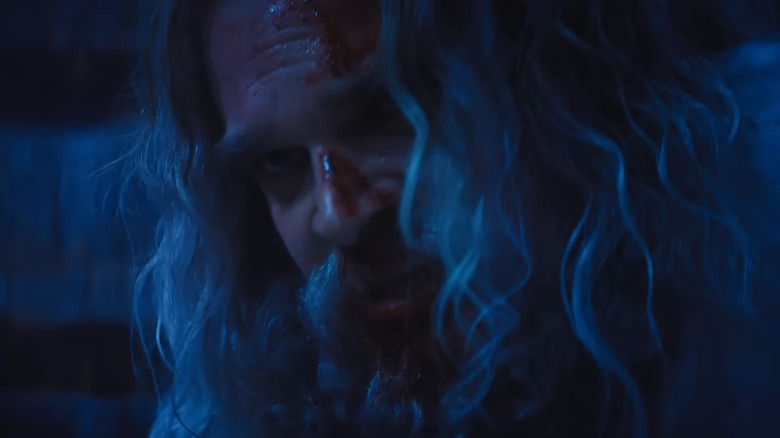The Ending Of Violent Night Explained
This article contains spoilers for "Violent Night."
You've probably never heard Santa Claus drop an f-bomb. As unlikely as it seems, foul language is just the tip of the iceberg when it comes to the 2022 film "Violent Night" shattering the typical rosy-cheeked, squeaky-clean image of jolly old St. Nicholas. The movie feels as endearing as the whimsical holiday movies families watch together year after year, and yet at the same time feels nothing like any of them at all.
David Harbour's portrayal of Santa is tired and gritty, but somehow still an authentic embodiment of who we all believe Santa to be. Intensely graphic action sequences — a signature of "Violent Night" producer David Leitch, who directed the similarly styled "Bullet Train" — are a complete 180 from the warm coziness of a typical Christmas movie, but at their heart is still the story of a family making amends with one another, which feels akin to just about every holiday tale you've ever seen.
By the time Santa flies away against the backdrop of the moonlight at the conclusion of "Violent Night," audiences are left with a lot to think about having witnessed this unique dichotomy of a film.
A renewed sense of purpose
We all get in those funks when we question our careers or wonder if what we do makes a difference. Whether it's just an off day or the self-reflection spirals into a midlife crisis, sometimes existentialism sends us down a path that's just a few notches too introspective for our own good. As it turns out, not even Santa Claus is exempt from this conundrum. Santa begins the film in a pretty bad place — pondering if he's still fit for the job, groggily drinking away his troubles at a bar. Right away, this is a signal that tells the audience this won't be your grandma's Christmas movie.
By the end of the film, Santa has his mojo back, largely thanks to the encouragement of young Trudy Lightstone (Leah Brady). Santa is ashamed of his past, pre-Santa life as a Viking who killed countless people with his hammer, Skullcrusher. He's not proud of who he was, but young Trudy encourages him to use those parts of himself from his past to do something good in the present, a lesson anyone can take to heart. If it wasn't for his former self, Trudy and her family might not have survived the night, as Santa's skills from his Viking era prove essential in taking down the bad guys.
Solving a major plothole of Christmas movies
There's a pretty significant plothole in most Christmas movies that center their story around the idea of Santa existing or not — "The Polar Express," "The Santa Clause," "Elf," the list could go on. In all of these films, adults don't believe in Santa and insist they're the ones who leave out presents for their kids. However, within the universes in which these movies take place, Santa is real and delivers presents to children around the world. How do these concepts coexist?
"Violent Night" clears up this flaw, at least partially. Toward the end of the film, Santa explains that he only visits the children who need him. If parents have got Christmas covered for their kids, Santa doesn't go to their house. This would clarify how adults in Christmas movies believe themselves to be the Santa substitutes — because they are. It's just another way that "Violent Night" completely upends the Christmas movie formula by admitting that in many cases, parents really are the ones who leave out presents, even in a universe where Santa is real.
Granted, this still leaves a few question marks. For the houses Santa visits, how do the parents think those presents got there if they didn't leave them out themselves? In "Violent Night," Trudy believes in Santa and her parents don't, yet Trudy has always received presents on Christmas from Santa. Did she just not show her parents her gifts from Santa? Do they not question it? The confusion is still present, but it's at least not present for everyone.
Swerving around a narcissist's playbook
It's cringe whenever someone gives a gift that they clearly bestow with their own selfish intentions in mind. Maybe the gift-giver just wanted the item for themselves and needed an excuse to buy it. Maybe it's really not a gift at all, but an intangible promise of a task that requires work or money. If you're on the receiving end, do you play along with the charade and pretend to be happy about "receiving" something that obviously only benefits the person who gave it to you? If you ask Gertrude Lightstone (Beverly D'Angelo), the answer is most definitely no.
Toward the climax of the film when it's time for Gertrude to receive her Christmas present from her son-in-law, the egotistical Morgan Steele (Cam Gigandet), he begins a pitch to invest funds into a prospective movie that he'd direct and star in. His acting career has yet to take off in the United States, but he's hugely popular in "parts of Asia," he says, and is sure his movie will be a hit. He just needs the money to make it, and presents Gertrude with the "opportunity" to be part of movie history as his Christmas gift to her. Gertrude can see right through him and dismisses his pitch — though Morgan is hardly the only selfish person in the family. Most of the "Violent Night" cast portray characters who could be in the running for snootiest narcissist.
A self-aware homage to Home Alone
Trudy in "Violent Night" just recently watched "Home Alone" for the first time, and when her grandmother's house gets taken over by vigilantes, she channels her inner Kevin McCallister to set a series of booby traps for the bad guys. "Violent Night" perhaps smartly gets ahead of any pandering comparison to "Home Alone" by directly acknowledging the classic Christmas film as its reference point. It's not oblivious to its similarities.
Many of the pranks Trudy sets up are familiar to those who watch "Home Alone" every year. A partially cut ladder ready to fall when someone begins climbing it, a nail placed on the floor just so, a series of heavy objects flying through the air. However, there's one major difference, and it's a solid case study in the Motion Picture Association of America's rating system. "Home Alone" is rated PG. "Violent Night" is rated R. Whereas "Home Alone" presented its pranks as silly gags, almost akin to a cartoon (the Wet Bandits walk away worse for wear but basically unharmed) "Violent Night" director Tommy Wirkola takes those concepts to their natural extreme. What would actually happen to a person if traps like Kevin left out for Marv and Harry befell them? What if the camera showed everything involved in any injury they would probably incur, no matter how visceral? Wirkola basically reimagines a graphic, R-rated version of the burglary third act from "Home Alone" to outrageous results.
The villain monologue
In "Violent Night," John Leguizamo plays Jimmy, whose codename is "Scrooge" for the heist operation upon the Lightstones' family vault. The audience spends most of the movie not knowing why Scrooge hates Christmas. When he traps Santa, the baddie finally clues everyone in on his tragic backstory with an old-school monologue in true Christmas villain fashion. Though the details are quite dark — perhaps par for the course for the film as a whole — the root of his hatred comes from an incident in which Santa let him down as a child.
It's a well-known move in many a holiday tale. Where "Violent Night" deviates from the norm is in how Scrooge is never redeemed. He never suddenly realizes the wonder of the holidays because someone gives him a hug. He never reflects on his wrongdoings and promises to change his ways. He stays a villain, and gets his due in the end.
Not giving up on love
Trudy's Christmas wish is for her separated parents, Jason (Alex Hassell) and Linda (Alexis Louder), to get back together. Restoration of lost love is an archetype familiar to many holiday films, especially of the Hallmark or Lifetime variety. "Violent Night," though, is just about as far from a Hallmark or Lifetime movie as you can get. As such, it wouldn't have felt strange for Jason and Linda to remain separated, even if getting back together would be typical of most former couples in their same situation in a Christmas movie.
Despite the many ways it subverts the expectations of a traditional holiday story, though, "Violent Night" stays on the rails where Jason and Linda are concerned. Reminded of each other's strengths as they fight to save their lives and protect their daughter, they fall back in love. Of course, it just so happens to be Christmas Eve.
Family reconciliation, but not how you'd expect
The holidays can be a time for resolving simmering family issues or healing longstanding trauma from the past. The same is true for the Lightstones, though their version of it might look a little bit different than most families.
Linda has never really gotten along with Jason's family. The Lightstone lineage is filthy rich, and it's Jason's unhealthy relationship with his mother — and her money — that jeopardizes Linda and Jason's marriage. Jason's family doesn't much care for Linda, either, viewing her as a golddigger. They're all just as surprised as anyone to find catharsis in pulverizing one of the vigilantes together. As Linda joins Jason's sister Alva (Edi Patterson) and Ava's son Bertrude (Alexander Elliot) in maiming baddie Gingerbread (André Eriksen) with crowbars, they acknowledge that it's the first time they've ever done something together as a family.
Similarly, Jason has had it with his mother's manipulative ways. In a twist, the audience discovers it's he who stole the money from her vault, with the intention of walking away from the family forever. Contrary to what might be expected, Gertrude says she's proud of Jason, as "a Lightstone always takes what's theirs."
While things seem cheery at the end of the movie, it's not completely clear if Jason still intends to make good on his promise to cut ties with his family. They've had an oddly therapeutic night, but their toxic behavior seemed to be the ultimatum that his marriage restoration was contingent upon. Have the night's events changed that?
Mrs. C to the rescue
Santa's downtrodden thoughts about his job don't seem to cross over into his marriage to Mrs. Claus. Santa loves Mrs. Claus, and he'd do anything to see her one last time when it appears his life might be at its end. When the bad guys are taken care of at the end of the movie, Santa's still got a job to finish. It's Christmas Eve, after all, and he has to deliver presents. There's just one problem: his reindeer flew off without him earlier, and Scrooge destroyed his magical sack of gifts.
Anticipating Santa's needs, Mrs. Claus, remaining offscreen the entire film and only ever mentioned by other characters, sends the reindeer back to Santa with a back-up magical bag. While Santa only ever discusses Mrs. Claus in depth with Trudy and never with Linda and Jason, his and Mrs. Claus' healthy marriage contrasts Linda and Jason's rocky one. In the end, though, both couples end up on the same page.
The way Mrs. Claus is spoken about throughout the entire film, but never actually shown, almost tees up the audience to expect she might appear. Given the nature of similar moments — when a character in a movie remains uninvolved and then shows up at the end — there is some precedence to even expect that Mrs. Claus might be portrayed by a surprise celebrity that Universal cleverly kept a secret. Sadly, though, that's not the case, and there's no onscreen payoff for Mrs. Claus.
The 'Magic of Christmas' trope
You've seen this moment before. It's the final scene of a Christmas movie. The heroes are so close to saving the day, but just before succeeding in their goal, there's an unprecedented shortage of "Christmas magic." Maybe it's phrased differently to say "not enough people believe in Santa anymore," or "there's no more Christmas spirit left in the world." It always seems that whatever the present time is in any given Christmas movie, there was always more holiday cheer in yesteryear.
Such is the case at the end of "Violent Night." Santa has died. Literally, truly, his dead body lies on the ground. Everyone saw him get shot and fall to his death. However, as each character mourns Santa's loss and expresses their newfound belief in him, he magically comes back to life. Overjoyed, he reveals that not even he understands the full extent of Christmas magic. Is it a cop-out? Sure. Have we seen this all before? Absolutely. (And not just in Christmas movies, either — the origin of this trope might go back to J.M. Barrie's original "Peter Pan" play, in which Tinker Bell dies and the audience revives her by expressing their belief in fairies.) There's a lenience in the trope's use all the same, though, as "Violent Night" — for all of its, well, violence — still really wants to let us know it's a Christmas movie at heart, where such moments are not only permissible, but expected.
Could this be the next great perennial Christmas flick?
There are new Christmas movies every year, but how often does one stick around to become a true Christmas classic that will endure for generations? What gives any holiday film an edge over another to earn its place among the greats as something that families enjoy every single year, a tradition that their holiday season is simply incomplete without? Any answer to those questions would probably involve a great deal of subjectivity, but the unique nature of "Violent Night" at the very least sets it apart from its holiday movie siblings in a way that might give it some degree of advantage.
In its prominence of gore, "Violent Night" doesn't really have a comparable movie in the category. It's not a horror film like "Krampus." It is an action film, which perhaps most closely places it alongside "Die Hard," but even then, there's some debate as to whether "Die Hard" is a Christmas movie, or simply a movie that takes place at Christmas. "Violent Night" is unequivocally a Christmas movie through and through. Will it have the legs to become a perennial favorite? For families who are all grown up and are looking for something more suited for them than the typically kid-friendly fare of most holiday films, it just might.
Would Universal bring Violent Night to Halloween Horror Nights?
Universal Studios in California and Florida both host Halloween Horror Nights (HHN) each year during September and October. HHN is one of the country's biggest haunt events, and typically a handful of its indoor haunted houses or outdoor scare zones are themed to well-known movies or television shows within the horror genre, like "The Black Phone" or "Us." With "Violent Night" being a Universal movie, it's worth wondering if it will be adapted into some sort of future HHN attraction.
Furthermore, the two most glaring reasons against including "Violent Night" at HHN have both never been problems for the event in the past. One could point out that "Violent Night" is not a horror movie, which it isn't — but HHN has sometimes featured intellectual property, even from outside studios, that isn't strictly horror but still is still inherently scary (like "Stranger Things"), as "Violent Night" definitely is. One could also argue that "Violent Night" is a Christmas movie, and this event is Halloween Horror Nights — but there's precedence of Christmas attractions at the event in the past (like the "Krampus" house and the "Christmas In Hell" scare zone). If Universal desired its inclusion, "Violent Night" could be stretched to fit the parameters of the event. Whether or not it ends up on the roster one day is anyone's guess.

